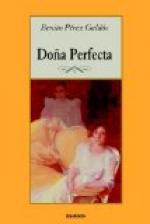The peasant assumed a melancholy look, and, affecting something of disdain for the fields that had been praised by the traveller, said in the humblest of tones:
“Senor, this is mine.”
“I beg your pardon,” replied the gentleman quickly; “now I was going to put my sickle in your field. Apparently the philosophy of this place is contagious.”
They now descended into a canebrake, which formed the bed of a shallow and stagnant brook, and, crossing it, they entered a field full of stones and without the slightest trace of vegetation.
“This ground is very bad,” said the young man, turning round to look at his companion and guide, who had remained a little behind. “You will hardly be able to derive any profit from it, for it is all mud and sand.”
Licurgo, full of humility, answered:
“This is yours.”
“I see that all the poor land is mine,” declared the young man, laughing good-humoredly.
As they were thus conversing, they turned again into the high-road. The morning sunshine, pouring joyously through all the gates and balconies of the Spanish horizon, had now inundated the fields with brilliant light. The wide sky, undimmed by a single cloud, seemed to grow wider and to recede further from the earth, in order to contemplate it, and rejoice in the contemplation, from a greater height. The desolate, treeless land, straw-colored at intervals, at intervals of the color of chalk, and all cut up into triangles and quadrilaterals, yellow or black, gray or pale green, bore a fanciful resemblance to a beggar’s cloak spread out in the sun. On that miserable cloak Christianity and Islamism had fought with each other epic battles. Glorious fields, in truth, but the combats of the past had left them hideous!
“I think we shall have a scorching day, Senor Licurgo,” said the young man, loosening his cloak a little. “What a dreary road! Not a single tree to be seen, as far as the eye can reach. Here everything is in contradiction. The irony does not cease. Why, when there are no poplars here, either large or small, should this be called The Poplars?”
Uncle Licurgo did not answer this question because he was listening with his whole soul to certain sounds which were suddenly heard in the distance, and with an uneasy air he stopped his beast, while he explored the road and the distant hills with a gloomy look.
“What is the matter?” asked the traveller, stopping his horse also.
“Do you carry arms, Don Jose?”
“A revolver—ah! now I understand. Are there robbers about?”
“Perhaps,” answered the peasant, with visible apprehension. “I think I heard a shot.”
“We shall soon see. Forward!” said the young man, putting spurs to his nag. “They are not very terrible, I dare say.”
“Keep quiet, Senor Don Jose,” exclaimed the peasant, stopping him. “Those people are worse than Satan himself. The other day they murdered two gentlemen who were on their way to take the train. Let us leave off jesting. Gasparon el Fuerte, Pepito Chispillas, Merengue, and Ahorca Suegras shall not see my face while I live. Let us turn into the path.”




